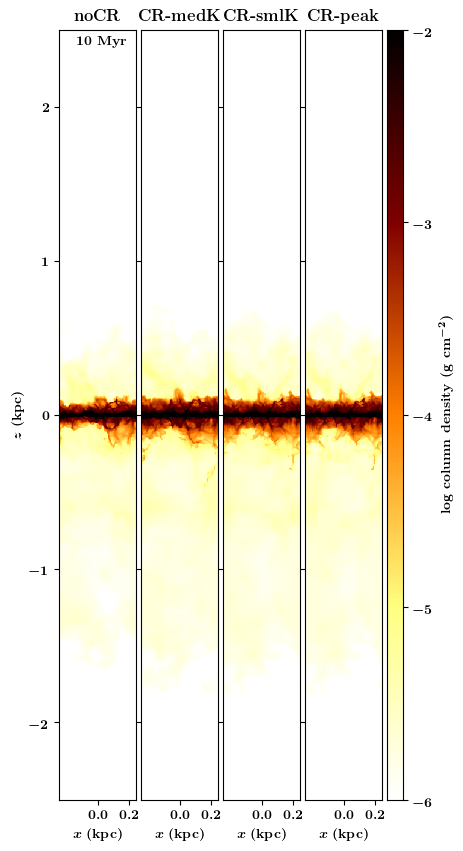SILCC with cosmic rays
Cosmic rays (CRs) are an important energy component in the interstellar medium. Being high-energy particles their coupling to the gas is not via direct particle-particle interactions as in the case for thermal gas because their cross section is very small. Instead CRs couple via the magnetic field. By gyrating around magnetic field lines and scattering off of magnetic irregularities, CRs transfer energy and momentum to the magntic field. Together with the approximation of ideal MHD, which freezes the magnetic field lines to the gas, CRs can effectively transfer energy and momentum to the gas and accelerate it. The interaction with the magnetic field allows them to move relative to the gas and effectively diffuse or stream through the ISM. By this mechanism the CR energy can be deposited far away from their production sites. The small effective cross sections also result in low cooling efficiencies for CRs with a momentum of a few GeV/c, which carry most of the CR energy in the ISM. As a result, CRs can prodive a long-lived energy reservoir with a vertical stratification in the galactic disk that can lauch galactic outflows.
We included CRs as a relativistic fluid into the SILCC setup in the diffusion-advection approximation. We investigate the impact of CRs in driving outflows in two papers:
We find that CRs are able to drive stable warm and smooth outflows with mass loading factors (ratio of outflow to star formation rate) of order unity. The simulation data (after acceptance of the papers) is publicly available at the SILCC data website, hosted at the Max-Planck Computing and Data Facility in Garching (MPCDF). An expample video for CR-driven outflows is shown in here:
or as mov: mov (7MB)
Movies from Girichidis et al. 2018a (column density)
large vertical extent

| fps | length | small | 590 px | 800 px | 1200 px |
|---|---|---|---|---|---|
| 15 | 100 s | mp4 | mp4 | mp4 | mp4 |
| 25 | 60 s | mp4 | mp4 | mp4 | mp4 |
| 35 | 43 s | mp4 | mp4 | mp4 | mp4 |
| 50 | 30 s | mp4 | mp4 | mp4 | mp4 |
upper part

| fps | length | small | 590 px | 800 px | 1200 px |
|---|---|---|---|---|---|
| 15 | 100 s | mp4 | mp4 | mp4 | mp4 |
| 25 | 60 s | mp4 | mp4 | mp4 | mp4 |
| 35 | 43 s | mp4 | mp4 | mp4 | mp4 |
| 50 | 30 s | mp4 | mp4 | mp4 | mp4 |
lower part

| fps | length | small | 590 px | 800 px | 1200 px |
|---|---|---|---|---|---|
| 15 | 100 s | mp4 | mp4 | mp4 | mp4 |
| 25 | 60 s | mp4 | mp4 | mp4 | mp4 |
| 35 | 43 s | mp4 | mp4 | mp4 | mp4 |
| 50 | 30 s | mp4 | mp4 | mp4 | mp4 |
Movies from Girichidis et al. 2016 (density, density, CR energy)
| name | time (sec.) | avi (large) | mov (large) | mp4 (large) |
|---|---|---|---|---|
| 25fps | 55 | avi, 1200 (69M) | mov, 1200 (26M) | mp4, 1200 (23M) |
| 35fps | 39 | avi, 1200 (50M) | mov, 1200 (21M) | mp4, 1200 (19M) |
| 50fps | 28 | avi, 1200 (35M) | mov, 1200 (18M) | mp4, 1200 (16M) |
Movies from Girichidis et al. 2016 (density, density)
| name | time (sec.) | mov (large) | mp4 (large) |
|---|---|---|---|
| 800px, 25fps | 50 | mov, 0800 (6M) | mp4, 0800 (7M) |
| 1024px, 25fps | 50 | mov, 1024 (8M) | mp4, 1024 (9M) |
| 1200px, 25fps | 50 | mov, 1200 (11M) | mp4, 1200 (12M) |
| 1280px, 25fps | 50 | mov, 1280 (11M) | mp4, 1280 (12M) |
